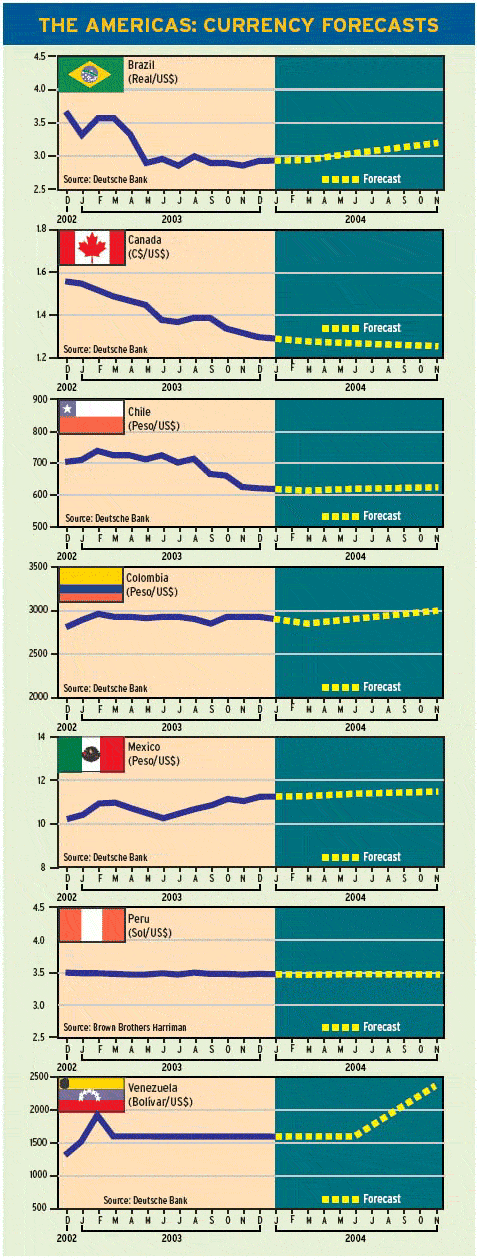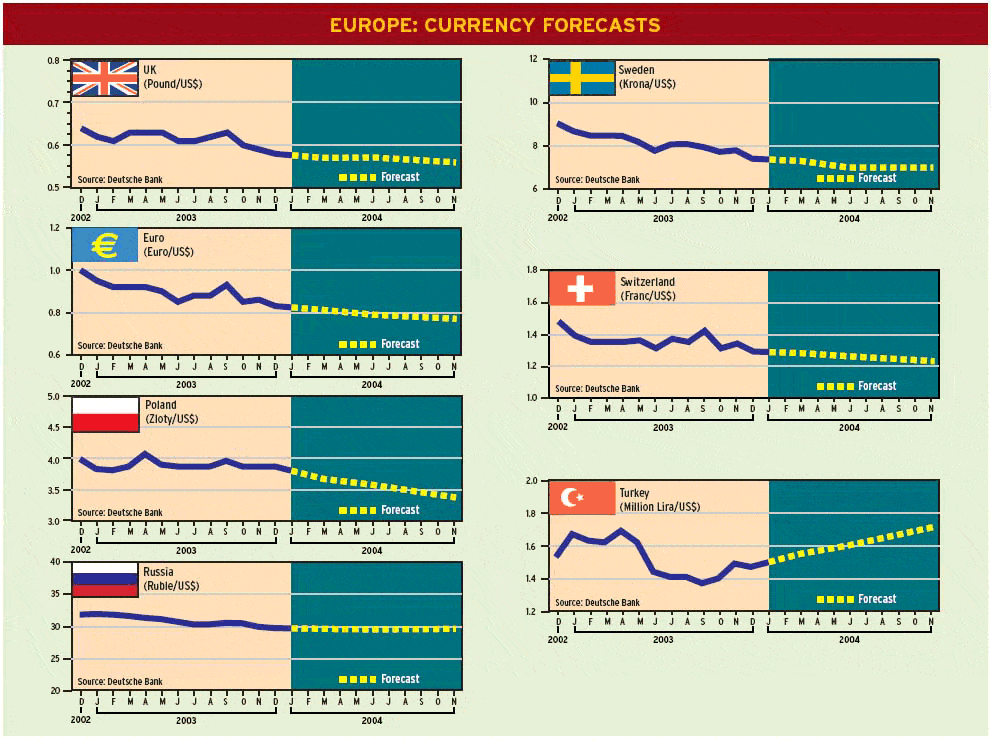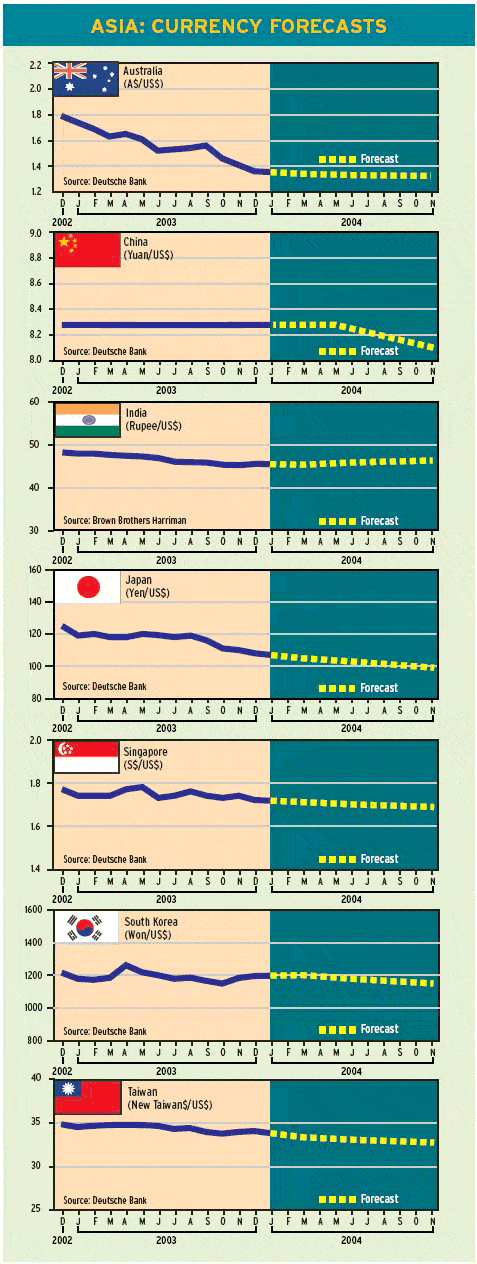THE AMERICAS

The US dollar gets no respect in the foreign exchange market these days, as traders hang around and wait for the crisis stage to unfold.
As the dollar plunged to a record low against the euro in December, nobody in Washington or Brussels or Berlin or Paris seemed to get very upset.
Its not as if the market needs fresh reasons to sell the dollar, as there is nearly a buyers boycott, says Marc Chandler, chief currency strategist at HSBC Bank (USA) in New York.
Policymakers in the US, Europe and Japan seem quite relaxed about the acceleration of the US dollars slide, Chandler says.
The usual price a country pays for a depreciating currency is inflation and higher interest rates, he says. On both counts, the dollars slide is nearly a free ride for the US. Price pressures remain mild, and US interest rates are at the lowest level in decades.
While market participants continue to cite the US current account and budget deficits for the dollars downtrend, Chandler says low US interest rates are a major consideration.
At what point will the slide in the dollar prompt foreign investors to shun US assets?
As long as the dollars decline continues to be at a sustainable pace, there will be no stampede by foreign investors out of US assets, says Ashraf Laidi, chief currency analyst at MG Financial Group in New York.
The fall becomes unsustainable when we see declines of more than 2% a day for at least three consecutive days, Laidi says.
One source of stability to foreign purchases of US assets is arising from foreign central banks, which have hardly shown any fluctuations in their demand for US assets, he says.
We expect the euro to peak about the time the US economy improves to the extent of producing sufficient jobs to prompt the Federal Reserve to raise rates, Laidi says.
As long as the Fed continues to signal that interest rates will remain low, the dollar will lose favor against the other high-yielding currencies, such as the euro, the British pound, and the Australian and Canadian dollars, he says.

David Gilmore, partner and economist at Connecticut- based Foreign Exchange Analytics, says that until there is a major shift in fundamentals, the best strategy is to ride out the volatility and wait for the exhaustive phase, the dollar crisis.
The story of the dollar in the last two years is nothing short of a soap opera, and one that ap- pears as if it will be renewed for another season of broadcasting, Gilmore says.
No matter what good news befalls the dollar, the script simply does not allow for any lingering optimism,much less celebration.The dollar is one beaten-down beast, he says.
Moments of optimism lure the viewer in for the feel-good period, and then without warning, the sensation is crushed by inherent character flaws representing structural failures, Gilmore says.
EUROPE European Rates May Boost Euro

The euro-area recovery is at last showing signs of genuine strength, as Germany, the zones biggest economy, posts some impressive numbers.
German output rose 2.4% in October, almost twice as much as expected. The gain in the countrys manufacturing output was the biggest monthly rise in 10 years. Factory orders rose three times as much as expected in October, portending further gains in output down the road.
The dispute over the Stability and Growth Pact is best viewed as a sideshow for the euro, says Philip Suttle, currency analyst at JPMorgan Chase in New York.
Improved regional growth conditions in 2004 should make it possible for both France and Germany to meet their budget targets in 2005 without additional fiscal tightening, Suttle says.
Higher euro-area growth and a slower-thanprojected decline in inflation have led JPMorgan Chases economists to bring forward their expectations of a tightening by the European Central Bank from 2005 to the second half of 2004.
A more-aggressive ECB will help the euro toward the end of 2004, Suttle says.
The Stability Pact, referred to by some as the Stupidity Pact,was foisted on the euro zone by Germany to ensure that fiscal discipline would be enforced after entry into European monetary union.
Today, the Stability Pact is all but dead, killed not by those who Germany had initially worried about, but rather by a bloc led by Germany itself, says Marc Chandler of HSBC.
Spain, the Netherlands, Austria and Finland resisted, but together did not have the necessary votes. So the EU finance ministers decided to halt the excessive deficit procedures against Germany and France, and watered down the EU budget recommendations.
Standard & Poors, the New York-based rating agency, commented that, to all intents and purposes, the rules-based fiscal framework in Europe has virtually disappeared.
It is hard to imagine how any future violations could possibly lead to a full application of the rules, S&P; said.Doing so would demonstrate such double standards that corrosive effects for the wider European agenda would be likely.
ASIA Further Yen Rise Could Hurt Profits
The yen is likely to continue to rise in 2004, posing a challenge to the profits of Japanese companies and adding to deflation, says Tomoko Fujii, currency analyst at Nikko Citigroup in Tokyo.
Securing corporate profitability in the face of a rising yen, persistent deflation and increasing pension contributions probably will require structural, rather than temporary, adjustments, Fujii says.
Deflation is already constraining profitability in many of the domestically oriented sectors of the economy, he says.
In order to maintain their competitiveness, Fujii says, Japanese companies will be encouraged to cut costs further and to shift production toward countries with lower labor and materials costs.
Gordon Platt



